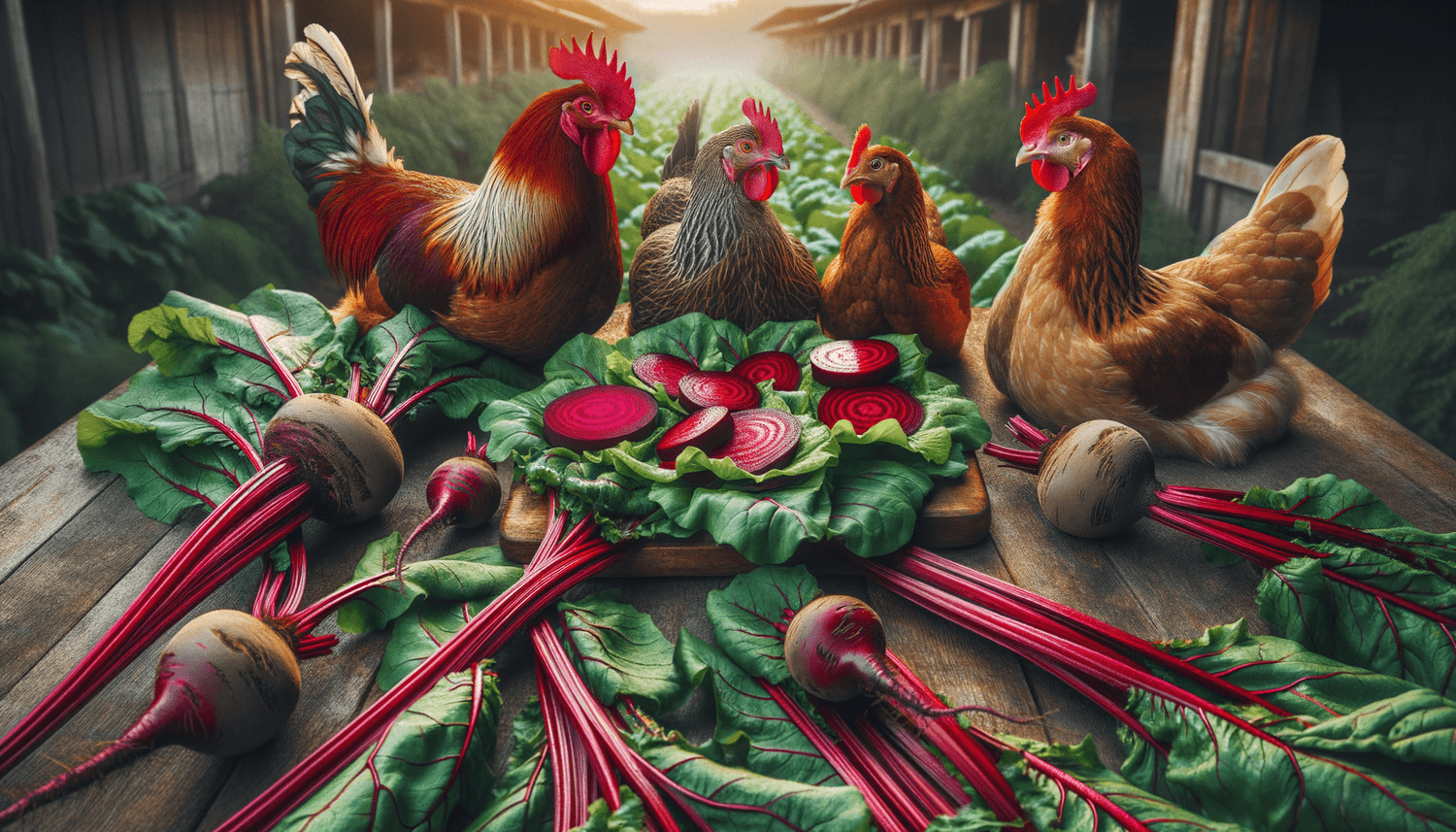Welcome, fellow backyard chicken enthusiasts! Today, we are going to bravely explore the thrilling world of beet leaves and our clucky, feathered friends. That’s right – we’re on a mission to uncover if chickens can munch on these leafy greens, the significance of striking that perfect dietary balance, and any potential benefits or risks that may come with beet leaves. We’ll also delve into the nutritional treasure hidden within these red-veined beauties, and of course, top it off with a dash of culinary flair on how to best prepare this food for your happy, healthy hens. So let’s ruffle our feathers and get ready to beat the beet with our egg-ceptional adventure!
Can chickens eat beet leaves?
Yes, chickens can safely eat beet leaves! In fact, beet leaves are an excellent source of nutrients for your backyard chickens. They contain essential vitamins and minerals that contribute to their overall health, making beet leaves a nutritious and safe addition to their diet.
A balanced diet for chickens
Just like humans, chickens too require a balanced diet for leading a healthy, happy life. A chicken’s nutritional requirements are best met with a high-quality chicken feed, which should make up around 80-90% of their total diet. This chicken feed ensures that they receive a proper blend of proteins, vitamins, minerals, and other essential nutrients required to maintain peak health and egg production.
Now, let’s talk about those delightful treats that add variety and excitement to our feathered friends’ meals! The remaining 10-20% of a chicken’s diet can consist of treats like fruits and vegetables, which provide additional vitamins and minerals that further complement their chicken feed. Introducing a mix of these tasty treats not only caters to the chicken’s natural foraging instincts but also contributes to their physical and mental well-being.
Nutritional value of beet leaves for chickens.
Feeding beet leaves to your backyard chickens provides them with a beneficial boost of essential vitamins, minerals, and hydration. These leafy greens are packed with valuable nutrients that can contribute to the overall health of your flock. Beet leaves are an excellent source of vitamins A and C, both of which play a crucial role in maintaining vibrant feathers and robust immune systems for your birds.
Moreover, beet leaves are rich in essential minerals like calcium, potassium, iron, and magnesium – all of which contribute positively to the general health and well-being of the chickens. Calcium, for instance, helps with strong eggshells and overall skeletal health. Additionally, beet leaves contain a high water content, which keeps your chickens refreshed and well-hydrated, especially during the warmer months. While making up only a small portion of their diet, adding beet leaves can indeed be a nutritious choice for your chickens.
Nutrition table of beet leaves for chickens.
| Information | Description |
|---|---|
| Nutritional Value | Rich in vitamins A and C, calcium, potassium, iron, and magnesium |
| Suggested Serving Size | A handful of beet leaves per chicken as part of the 10-20% of their diet made up of treats |
| Safe Feeding Practices | Wash the beet leaves and serve them raw or cooked, either whole or chopped |
| Preparation | Rinse well, remove the stems and any spoiled leaves; can be served raw, steamed, or sautéed |
| Potential Risks | Overfeeding can lead to an unbalanced diet, so limit beet leaves to occasional treats |
| Hydration | High water content helps to keep chickens hydrated and refreshed |
| Digestion | Easily digestible if served in moderation and the stems are removed |
| Seasonal Availability | Available throughout the year, but peak season is during the cooler months |
| Other Benefits | Can serve as a natural food source during the chickens’ foraging activities |
Beet leaves as a treat
When considering serving beet leaves to your flock, it’s essential to remember that these leafy greens should be offered as occasional treats. Treats should make up only 10-20% of your chickens’ diet, with the majority of their nutritional needs being met by a high-quality chicken feed.
Offering beet leaves in reasonable quantities ensures that your chickens reap the benefits of their nutritional properties without compromising the balance in their diet. Moderation is key when it comes to feeding any extras to your backyard chickens.
Preparing beet leaves for your chickens
Preparing beet leaves for your chickens is a simple process. First, ensure that you thoroughly wash the leaves to remove any dirt, pesticides, or contaminants. You can choose to serve the leaves raw or cooked, depending on your flock’s preference. Removing the stems and any spoiled leaves is an essential step to make it easier for your chickens to consume and digest the beet leaves. You can serve them whole or chop them into smaller pieces to cater to the various sizes and preferences of your flock members.
Monitoring your chickens’ health
Introducing new treats like beet leaves to your chickens’ diet is an excellent opportunity to monitor their health and evaluate the effects of these additions. Keep an eye on your chickens’ behavior and egg production to ensure that they are maintaining optimal health.
If you notice any signs of discomfort, digestive issues, or a significant change in egg production, make adjustments to their diet accordingly. Observing the health and well-being of your flock is crucial in providing the best care for your backyard chickens.
In conclusion, beet leaves are a nutritious and safe treat that can be included as part of your backyard chickens’ balanced diet. Offering these leafy greens in moderation, and following appropriate serving and preparation guidelines, will ensure that your flock enjoys the benefits of these treats without compromising their overall health. So why not add a splash of color and nutrition to your chickens’ menu with some beet leaves and watch them cluck away happily in their coop!

















